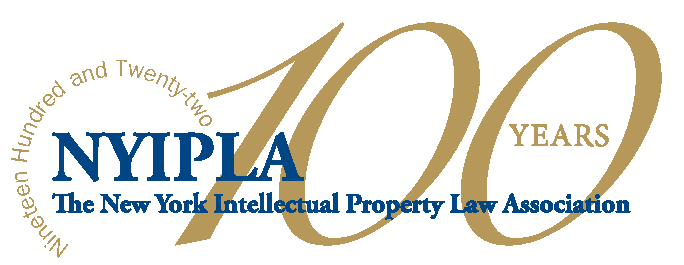NYIPLA Urges Supreme Court to Review Federal Circuit Decision Affirming Inequitable Conduct Judgement Based on Adverse Inference to Deceive the PTO Drawn as Litigation Sanction
Peter G. Thurlow, President of the NYIPLA, Irena Royzman, Jordan M. Engelhardt, Nicole A. Conlon, and Robert J. Rando were authors on the brief. Irena Royzman is Board Liaison of the NYIPLA’s Committee on Amicus Briefs.
On Friday, June 29, 2018, the New York Intellectual Property Law Association (“NYIPLA”) filed an amicus brief urging the Supreme Court to grant the petition for a writ of certiorari in Regeneron Pharmaceuticals, Inc., v. Merus N.V., No. 17-1616. The petition presents an issue of exceptional importance to the patent system: the evidence required for a court to nullify a patent for inequitable conduct before the U.S. Patent and Trademark Office (“PTO”).
In its decision below, the Federal Circuit panel majority upheld an “adverse inference” that two prosecuting attorneys intended to deceive the PTO during patent prosecution drawn as a sanction for discovery misconduct by litigation counsel in a patent enforcement suit years later. By upholding the district court’s adverse inference sanction, the Federal Circuit affirmed the judgment nullifying the patent-in-suit under the inequitable conduct doctrine. As Judge Newman observed in dissent, the trial court had drawn an adverse inference of intent to deceive the PTO without review of the evidence, and thus “no evidentiary record was developed on intent to deceive, with no testimony and no opportunity for examination and cross-examination of witnesses.”
The NYIPLA’s brief explains that the Federal Circuit’s decision below striking down a patent absent evidentiary proof of intent to deceive the PTO contravenes Supreme Court precedent, creates a split of authority in the Federal Circuit, and raises serious procedural due process concerns.
Beginning with the seminal case of U.S. v. American Bell Telephone Co., 128 U.S. 315 (1888), the Supreme Court has consistently held that revoking a patent right that was improperly procured requires evidence that the patent applicant acted with a culpable mental state during patent prosecution. As the NYIPLA’s brief explains, Supreme Court precedent thus “makes clear that litigation misconduct outside of patent prosecution does not provide a basis to revoke the patent.” Under Keystone Driller Co. v. General Excavator Co., 290 U.S. 240 (1933) and its progeny, the remedy for litigation counsel’s misconduct in a suit to enforce the patent is dismissal of the lawsuit where the litigation misconduct occurred—not nullification of the underlying patent right.
The decision below affirming patent nullification on the basis of litigation misconduct is also irreconcilable with the Federal Circuit precedent in Aptix Corp. v. Quickturn Design Systems Inc., 269 F.3d 1369 (Fed. Cir. 2001), in which the Federal Circuit held that “[l]itigation misconduct, while serving as a basis to dismiss the wrongful litigant, does not infect, or even affect, the original grant of the property right.” Thus, as Judge Newman observed in dissent and the NYIPLA emphasizes in its brief, the decision below “produced an irreconcilable split in [Federal Circuit] jurisprudence, to the detriment of stability of law and practice.”
As the amicus brief further explains, the decision below raises serious procedural due process concerns. Because patents are a form of property secured by the Due Process Clause of the Fifth Amendment, patent-owners are entitled to a meaningful opportunity to be heard on the issue of intent to deceive the PTO before their property rights are revoked under the inequitable conduct doctrine. The NYIPLA urges that “[t]he resulting deprivation of property, absent any hearing or evidentiary record on intent, runs afoul of due process and provides another reason for [Supreme Court] review.”
The NYIPLA urges the Supreme Court to grant the petition in order to address several issues of exceptional importance raised by the decision below for the patent system and its many stakeholders. The decision below affects the prosecution bar at the most basic level: their careers and personal reputations. As the NYIPLA’s brief explains, “[p]atent prosecutors now face the prospect of being found guilty of inequitable conduct before the PTO as a result of alleged discovery misconduct by litigation counsel, that the patent prosecutors have no connection to and do not control, in court proceedings years later.” For patent-owners and litigants, the decision below will invite defendants to exploit discovery disputes to make out inequitable conduct claims based on the conduct of opposing counsel, imposing heavy burdens on the courts and detracting from the merits of validity and infringement. As the NYIPLA’s brief further explains, “the decision below adds confusion to precedent for district courts by diverging from settled law from [the Supreme Court] and the Federal Circuit that had been followed consistently for decades.”
The NYIPLA’s brief urges the Supreme Court to grant the petition “in order to correct the Federal Circuit’s course and confirm that intent to deceive the PTO must be proven before a patent is nullified, not inferred as a litigation sanction.”
To read the full amicus curiae brief, click HERE.
